This tutorial will break down the triggers, actions and object animations available to enrich Adobe Aero scenes.
Behaviors allow you to apply animations, interactions and depth to your projects in Aero. Let’s explore the different triggers and actions and what they can provide to expand the story we are telling within our scene.
Triggers
Triggers prompt objects within your scene to behave in ways you specify.
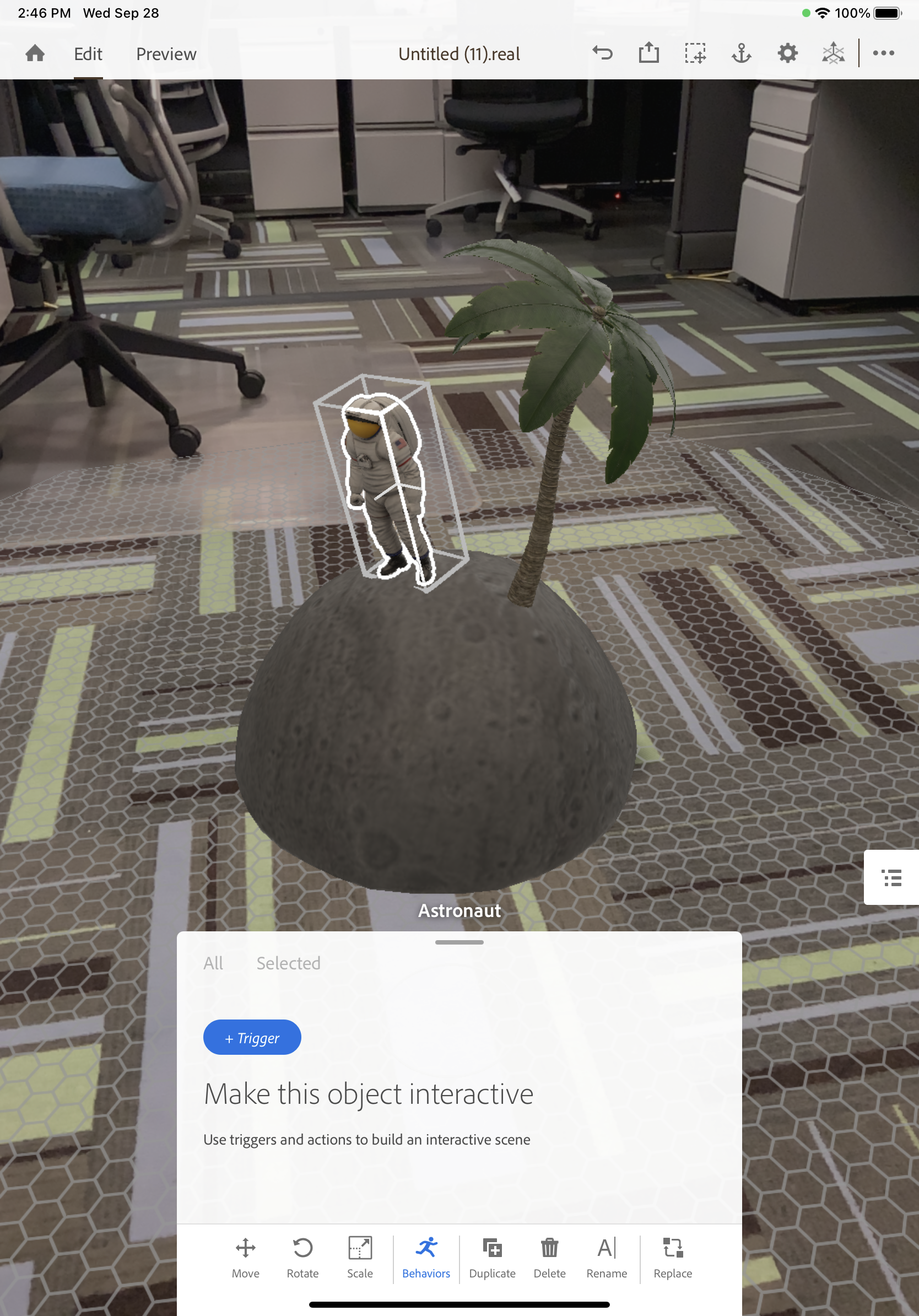
There are four types of Triggers:
- Start
When the program starts the behaviors will play immediately. - Tap
When an object is tapped, the behavior will play. - Proximity Enter
When the device enters a certain distance of a specific object, the behavior will trigger. - Proximity Exit
When the Device exits a certain distance of a specific object, the behavior will trigger.
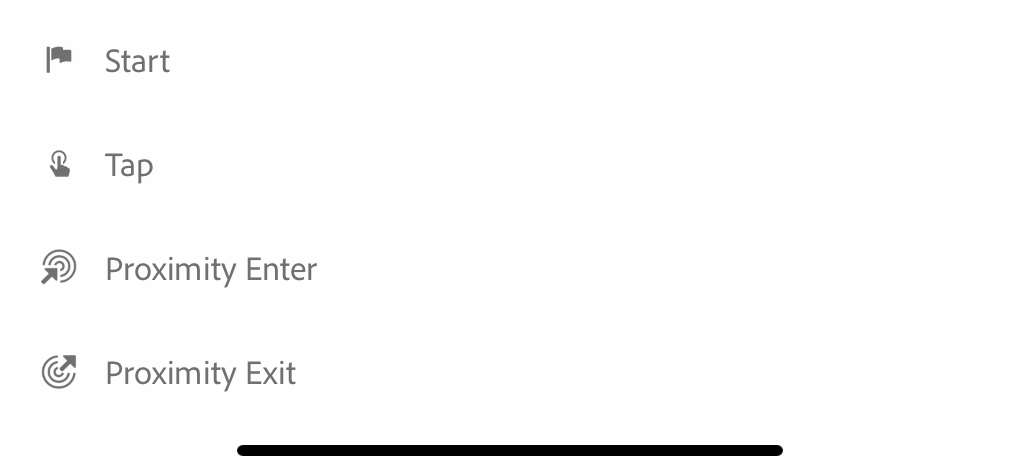
Once a Trigger is selected, you will define its specific parameters on a brief confirmation screen. Once approved you will see your trigger is added to your Behavior menu.
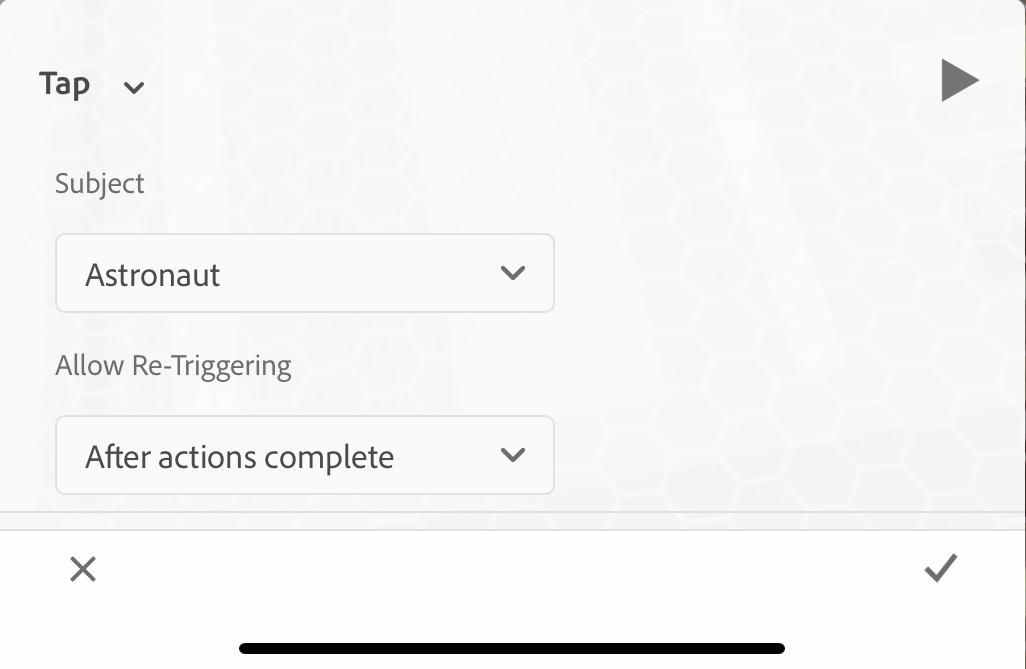
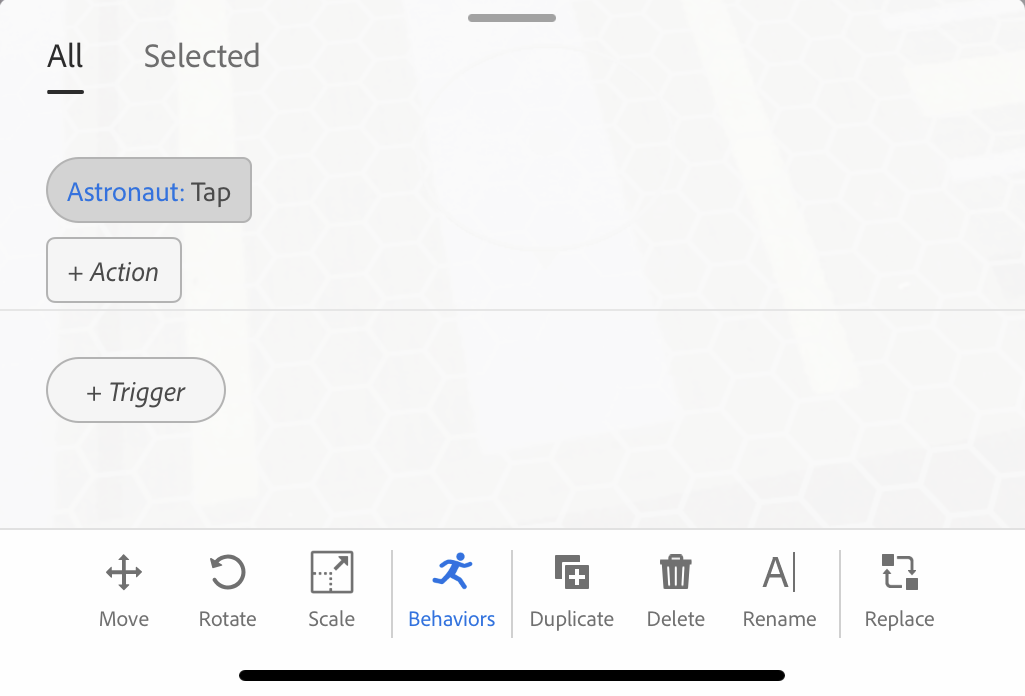
Actions
Actions inform how objects will behave after they have been prompted by a Trigger within your scene.
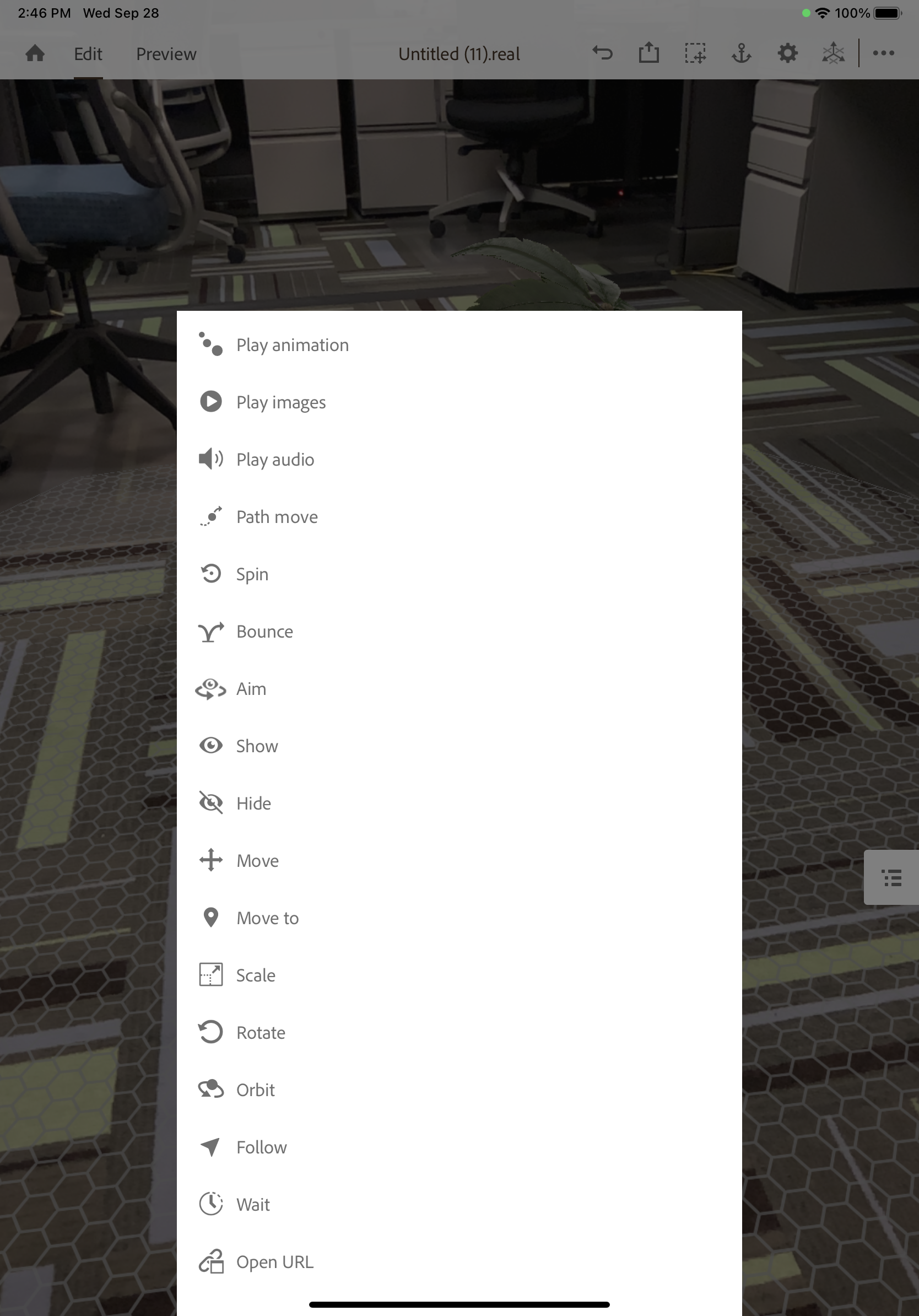
There are sixteen types of Actions:
- Play Animation
Play Animation can be applied to any 3D model that has built in animations. All of the directable characters inside the starter assets have animations, once this action is selected you can fine tune and select which animations you want by exploring clip options. - Play Images
Play Images is perfect when using png sequences and gif animations inside your project. If you add a gif through your photo library apply this action and your gif will play based on your trigger. - Play Audio
Play Audio is perfect for adding sound effects to your projects. Audio files will need to processed and saved either to your Adobe Creative Cloud account or to the files on your local device. - Spin
Spin will make the object spin in place once the trigger is activated. - Bounce
Bounce will make the object bounce in place once the trigger is activated. - Aim
Aim will make the object face the viewer or another object. - Show
Show will make the object appear if hidden when trigger is activated. - Hide
Hide will make the object disappear if visible when the trigger is activated. - Move
Move will offset the axis of an object by certain distances when the trigger is activated. - Move To
Move To allows the user to place a pin in the scene and will move the object selected to the pin when the trigger is activated. This action can also make directable characters walk through built scenes to specific locations. - Scale
Scale will increase or decrease the size of the object selected when the trigger is activated. - Rotate
Rotate will tilt the selected object on a specific axis when the trigger is activated. - Orbit
Orbit will make the selected object animate around another object in the scene. - Follow
Follow will make the selected object follow another animated object. - Wait
Wait will place a specific amount of time between two actions. - Open URL
Open URL allows you to create buttons inside your project that will open a browser window.
Object Animations
Object Animations allow assets with built in actions to animate within your project. More information can be found in this Adobe tutorial.
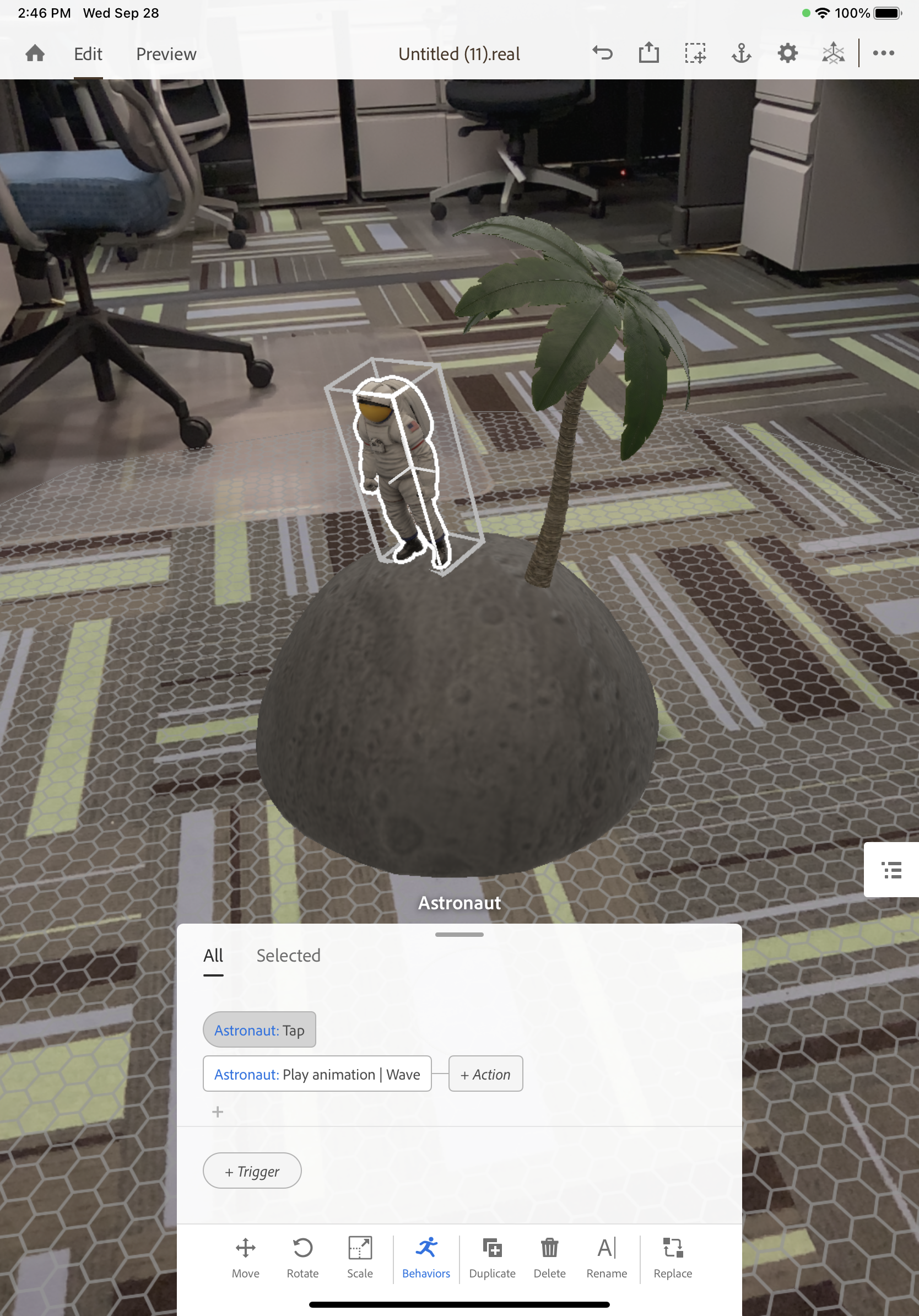
There are ten types of Object Animations. Each object may have slightly different options when applying animations to the object.
- Subject
The subject will be the object that is selected. - Animation Set
This is referencing the animation that is assigned to this model. - Clip
Which animation is being applied to the model that is selected. - Clip Length
Will determine the animation’s play time. - Speed
Speed will make the animation go faster or slower. - Transition
This option allows you to chain together multiple Play animation actions on the same object while ensuring a smooth visual transition between them.- If the animation clip contains forward motion but you want the object to remain in place, activate Treadmill option.
- If the animation clip contains forward motion but you want the asset to jump back to the start position at each loop iteration, activate Return to start position option.
- If the animation clip contains forward motion but you want the object to remain in place, activate Treadmill option.
- Play Count
How many times your animation will play. - Delay
Time between when the trigger is activated and the animation starts playing. - Infinite
Loop your animation forever. - Back and Forth
When your animation finishes it will play in reverse to the beginning and play again. - Move To
Move To allows the user to place a pin in the scene and will move the object selected to the pin when the trigger is activated. This action can also make directable characters walk through built scenes to specific locations. - Scale
Scale will increase or decrease the size of the object selected when the trigger is activated. - Rotate
Rotate will tilt the selected object on a specific axis when the trigger is activated. - Orbit
Orbit will make the selected object animate around another object in the scene. - Follow
Follow will make the selected object follow another animated object. - Wait
Wait will place a specific amount of time between two actions. - Open URL
Open URL allows you to create buttons inside your project that will open a browser window.
